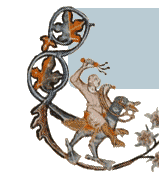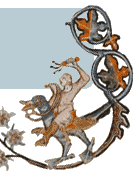

The workshop will take place from 15—17 April 2009.
A series of 9 lectures and seminars on a variety of topics in English medieval literature and English historical linguistics. The Oxford-Prague Medieval Workshop is regularly hosted by the Department of the English Language and ELT Methodology and the Department of Anglophone Literatures and Cultures, Charles University in Prague. The series, an integral component of the programme of English and American Studies, is primarily designed for M.A. students.
Reading materials are available on a separate password protected page. If you haven't received the password, please contact us.
Wednesday, 15 April
- 9.30 – 11.00, Helen Cooper: "Desirable Desire" (lecture)
Our ideas about love in the medieval romances are often shaped by preconceptions about the Church's distrust of sex, men's distrust of women's sexuality, and Petrarchan ideas about the male lover. Many of the romances, however, from the earliest examples through Shakespeare's late plays, are in fact grounded on the secular dynamics of family and dynasty in ways that promote a radically different set of assumptions and ideals. - 11.15 – 12.45, Simon Horobin: "What’s new in Chaucer’s Language?" (lecture)
Since the fifteenth century Chaucer’s readers have insisted that he revolutionised the English language and this view has become a commonplace in much modern scholarship, although critics have struggled to determine precisely the nature of Chaucer’s contribution to English. In this lecture I will assess the extent to which Chaucer’s language was innovative and attempt to define his contribution to the making of the English literary language.
coffee break
- 14.00 – 15.30, Richard Dance: "Rhyme and Punishment: the Poetry of the Anglo-Saxon Chronicle" (seminar)
Numerous passages in the several manuscripts of the Anglo-Saxon Chronicle have been identified as verse (some more securely than others), in a total of fourteen annals. In this seminar we shall analyse some of these pieces, investigating their metrical forms, styles and themes. These vary enormously from the classical heroic panegyric of the tenth-century poems (e.g. 'The Battle of Brunanburh') to the political/satirical rhyming verse of the later eleventh century (e.g. 'The Rime of King William'), and pose interesting questions about the development of English poetry across the Norman Conquest and its place in the broader project of the Chronicle.
lunch break
Thursday, 16 April
- 9.30 – 11.00, Helen Cooper: "Chaucer and Antifeminism" (seminar)
Chaucer was thoroughly familiar with the materials of medieval clerical antifeminism and draws on them extensively in many of his works, not least for his creation of the Wife of Bath. Whether he was in fact 'wommen's friend', as Gavin Douglas commented, is an altogether more disputed matter, and one on which readers and critics over the centuries have come to radically different conclusions.coffee break
- 11.15 – 12.45, Simon Horobin: "Chaucer’s texts" (lecture)
The recent identification of Adam Pinkhurst as the scribe who worked for Chaucer and who copied the earliest and best copies of the Canterbury Tales has changed the way that we assess those manuscripts and their status as evidence for Chaucer’s text. In this lecture I will consider the implications of this identification for our understanding of the copying and circulation of Chaucer’s texts, and for the way that they are edited today.lunch break
- 14.00 – 15.30, Simon Horobin: "Reading Chaucer’s Language and Text" (seminar)
This seminar will consider how the linguistic and textual approaches outlined in the lectures can be applied to a close reading of sample passages from Chaucer’s works.coffee break
- 15.45 – 17.15, Richard Dance: "The Lurking Viking: Tracing the Evidence for Scandinavian Influences on Early English" (lecture)
Contact with speakers of Old Norse in the Viking Age had important effects on the development of the English language, particularly its vocabulary. This lecture will explore the legacy of that contact, and investigate the means by which scholars have tried to identify Norse linguistic material in medieval English texts, including Old and Middle English literature.
Friday, 17 April
- 9.30 – 11.00, Richard Dance: "Old English Sounds and Dialects: An Introduction" (lecture)
This lecture will introduce the principal phonological changes that occurred in the Old English period, and which transformed Old English from the language brought to England by the Anglo-Saxon settlers to that recorded in the major literary texts. These changes, and the dialect differences to which they contribute, will be illustrated via excerpts from texts drawn from a range of periods and places.coffee break
- 11.15 – 12.45, Helen Cooper: "Shakespeare and Chaucer: The Case of A Midsummer Night's Dream" (lecture)
A Midsummer Night's Dream is often described as a play without a source, or written under general Ovidian influence with a little touch of Chaucer (especially the Knight's Tale). This lecture will argue that the play is an attempt on Shakespeare's part to write a dramatic equivalent of the Canterbury Tales in miniature, performed in the knowledge that his audience would recognize it as such.
See also the workshop registration procedure and requirements.
